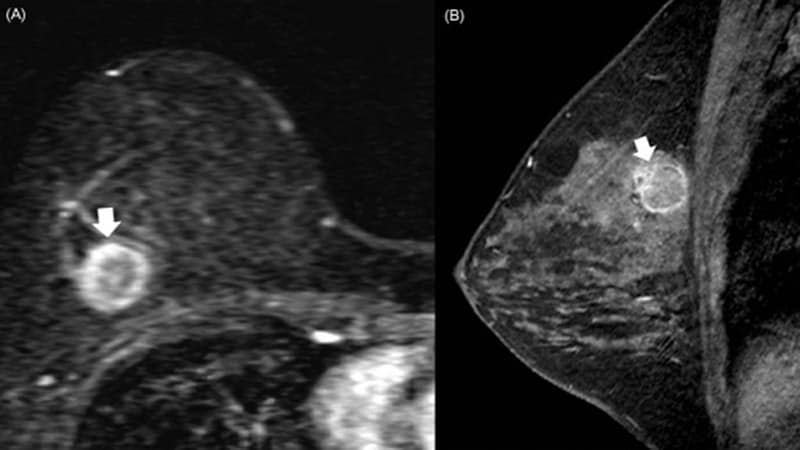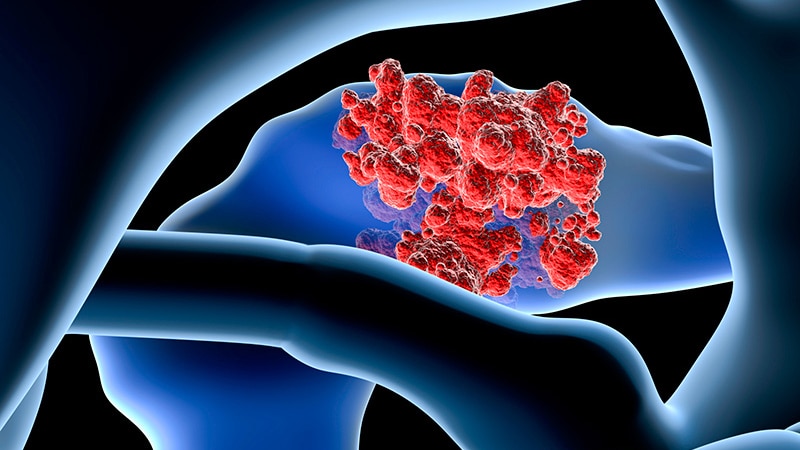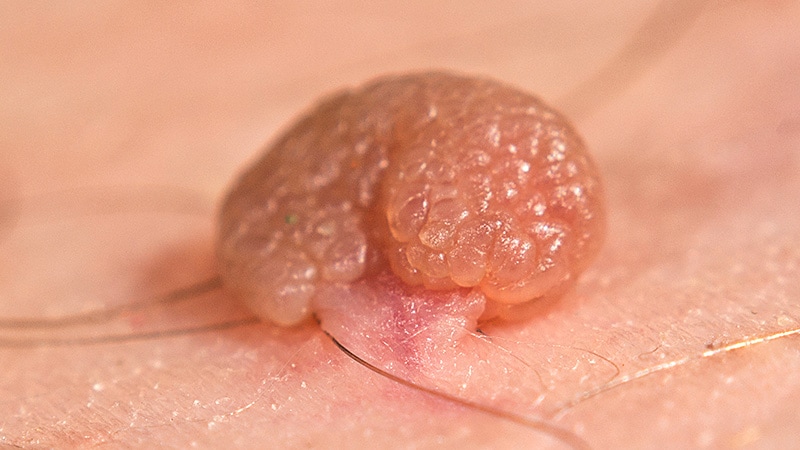This transcript has been edited for clarity. For more episodes, download the Medscape app or subscribe to the podcast on Apple Podcasts, Spotify, or your preferred podcast provider.
Benjamin L. Schlechter, MD: Hello. I'm Dr Benjamin Schlechter. Welcome to Medscape's InDiscussion series on colorectal cancer. Today we're discussing young-onset colorectal cancer with Dr Kimmie Ng. Dr Ng is the associate chief of the Division of Gastrointestinal Oncology at the Dana-Farber Cancer Institute and the co-director of the Colon and Rectal Cancer Center. She's also the director of translational research and the founding director of the Young-Onset Colorectal Cancer Center. She's an associate professor at Harvard Medical School as well.
Dr Ng, you are a recognized expert in young-onset colorectal cancer, and your work has set the standard for investigating young-onset cancers broadly across multiple tumor types. Before we dive into this topic and the emerging crisis of young-onset colorectal cancer, I want to hear a bit about your pathway to becoming a GI oncologist.
Kimmie Ng, MD, MPH: I first became enamored with cancer malignancy through the molecular mechanisms by the time that I spent in a laboratory during college. When I got to medical school, I started to become more interested in more translational clinical projects. And when I started taking care of patients and seeing patients in the clinical wards, I realized how gratifying it was to be an oncologist. I thought I wanted to work on breast cancer because there was some breast cancer in my family. But when I rotated on a GI oncology service, I realized the breadth of different tumor types that needed to be mastered and learned, and just how poor the prognosis was for so many of these GI cancers, that I became motivated and passionate about trying to make things better for patients with GI cancer.
Schlechter: It's fascinating as we go through this series. Time and again, we hear from investigators about their path. No one starts as a GI oncologist, and everyone sort of sees the light as they see these patients. I think it emphasizes the educational aspect in our trainees. We need trainees. We need residents and fellows seeing these patients early on, and medical students so we can engage them in this important work.
Ng: GI cancers make up nearly a quarter of all cancer-related deaths. This is a huge burden on people, and we really need a lot more research advances in this area.
Schlechter: That gets us to our topic. We've heard a lot lately about young-onset colorectal cancer. It's in the news. There are celebrities, there are friends, there are family members who have young-onset colorectal cancer. I want to start with some definitions. Who are these patients and how prevalent is this issue?
Ng: Young-onset colorectal cancer is defined as a patient who was diagnosed with colorectal cancer under the age of 50. That is the age threshold because 50 was the age at which average-risk individuals would start colorectal cancer screening, and anybody under that age was not getting screened. These patients, though, are increasing significantly over the past few decades. We noticed an uptick in young-onset colorectal cancer starting in the mid-1990s, where there's been about a 2% per year increase in young people being diagnosed with this disease steadily since then. Unfortunately, this is now the second leading cause of cancer-related death in young women and the leading cause of cancer-related death in men under the age of 50.
Schlechter: That's a striking change to think about — that colorectal cancer is catching up and will surpass breast cancer in women, and is the leading cause of death among young men. Is this all demographics? Is it Black? Is it White? Is it Latino? Who gets young-onset colorectal cancer?
Ng: Unfortunately, this is something that's universally affecting all different races and ethnicities, where we have available data. Of course, the rise is steepest seemingly in non-Hispanic Whites, and we don't quite understand yet why that is. But there are documented rises in every race and ethnicity, and this is a global phenomenon. This is happening in most countries around the world. It is mostly in higher-socioeconomic status and westernized countries. But rises are being demonstrated in Asia and African countries as well.
Schlechter: Wow. So, something really has changed in this time period. What are the differences? What type of colon cancers are these patients getting? Is this all Lynch syndrome? Is there some other pattern of presentation? What are we talking about here?
Ng: The natural question, when people hear about younger and younger folks being diagnosed with this, is whether it is due to some change in human genetics. Is there just more hereditary colorectal cancer being diagnosed? While it is true that it is much more common to find a hereditary predisposition or a family history of colorectal cancer when you're diagnosed at a younger age, the vast majority of these are sporadic. When you look at the incidence patterns, it follows what we call a birth cohort effect, where the increase is generational. What this means is that there is likely some environmental exposure that is leading to this rise in young-onset colorectal cancer. But as of now, we're not sure what exactly those environmental exposures are.
Schlechter: We've seen a lot of data on the genetics of these patients, and I think about some of the work published recently by Chris Lieu and his group out of Colorado, looking at different mutational profiles. What do we know about this? The change in APC mutations, TP53 — what's the story here, and what does this mean for us?
Ng: The landscape is currently still kind of confusing, and I do think that there is still a lot of work to be done in this area to better characterize the genomics of young-onset colorectal cancer compared with older-onset colorectal cancer. But what we know so far from published literature is that based on available next-generation sequencing panels, there do not seem to be significant differences in somatic alterations between younger-onset and older-onset cancers. There were some initial publications that indicated perhaps fewer APC mutations, fewer KRAS mutations among younger patients compared with older patients, but then another study, out of Memorial Sloan Kettering Cancer Center, was able to adjust for the sidedness of the primary tumor, for example. When that was done, a lot of these differences went away or became non–statistically significant.
I think we still have a lot of work to do. I do think we need deeper genomic profiling, whether with whole exome sequencing or whole genome sequencing. We need to take a better look at mutational signatures that may be different between younger and older patients. And all of that is being worked on by several different groups.
Schlechter: What about tumor mutational burden (TMB)? Do we have anything else here?
Ng: I don't think there have been consistently reported differences in TMB. There was an abstract presented at ASCO in 2023 using whole exome sequencing of stage I, II, and III colon cancer patients that did seem to suggest that there may be more microsatellite-stable TMB-high profiles among younger-onset colorectal cancer patients, maybe due to more POLE mutations. That, I think, needs to be confirmed further with larger validation cohorts. If true, that certainly means there could be differences in treatment recommendations based on your age. This highlights the importance of better understanding the genomic differences between younger and older patients.
Schlechter: What about clinical factors? Are these rectal cancers, left-sided cancers, or right-sided? We increasingly think about colon cancer as three diseases in terms of treatments. Where do these patients fit?
Ng: Very curiously, almost all the patients with young-onset colorectal cancer have left-sided tumors, and many of them are rectal tumors, much more so than an older patient who gets diagnosed with colorectal cancer. We know that, as you said, the tumors arising from different parts of the colon and rectum are very different in terms of prognosis as well as response to therapies. It is another important question in the field to try to figure out. Why is it that the vast majority of young-onset colorectal cancers arise in the left colon or rectum? There are some other clinical differences that have been noted as well. Some reports mentioned more mucinous and signet ring cell histologies among younger-onset tumors. Unfortunately, the vast majority of younger-onset patients get diagnosed with stage IV colorectal cancer rather than earlier stages. Part of that may be due to the fact that they weren't being screened. Part of that may be due to delays in diagnosis that happen when a young and otherwise healthy person presents with symptoms. We also suspect that younger-onset colorectal cancers may be more aggressive and possibly less responsive to treatment.
Schlechter: That's a troubling combination of factors. Left-sided cancers, rectal cancers, mucinous cancers, signet ring cancers — all the hard ones. In my practice here with you in the Young-Onset Colorectal Cancer Center, one of the things I noticed is that it feels like these young patients never come in for treatment in the same state as the older patients. They don't seem to have a clear pathway from primary care or urgent care in to see us. What do we know about how many visits it takes to get these patients in and how to connect them with oncology?
Ng: It's really hard with these younger patients, many of whom, as I'm sure they've told you as well, have never even heard of colorectal cancer. They don't know what it is or think it's mainly a disease of older individuals. In a survey study conducted by the Colorectal Cancer Alliance of over 1000 young patients with colorectal cancer, many of them had to see two or three different physicians before being diagnosed with colorectal cancer. Many of them end up diagnosed with hemorrhoids or irritable bowel syndrome initially, and then many of them waited over 6 months before even seeking medical attention for symptoms that they've been experiencing. I think that just highlights a lack of awareness that colorectal cancer can happen in a young person.
Schlechter: Once a patient's diagnosed and we see this patient, it's unfortunately usually their third or fourth round of seeing a doctor. They have had some sort of rectal bleeding or some sort of symptom for which they're seeking treatment, and they finally end up with us in medical oncology. What are some special considerations for young patients? Are there different treatments, different biological considerations, different social considerations we need to think about?
Ng: I participated in an international consensus conference that tried to come up with general guidelines as to how to treat these patients. For the most part, the surgical, radiation, and medical oncology care of these patients currently is exactly the same as for an older patient. The key differences that we came up with in our recommendation statement were, one, that all patients should be referred for germline genetic testing to identify whether there is a hereditary predisposition present. And the second was that young patients do need to be referred for fertility preservation and counseling. Unfortunately, a lot of these patients under the age of 50 are still in the midst of creating their families or expanding their families. Fertility is of huge concern, especially if we think about the fact that most of these cancers are rectal cancers and are often treated with pelvic radiation that results in infertility. These are just some of the unique considerations and challenges that younger patients face that are different from in older patients. This was part of the motivation for us creating our Young-Onset Colorectal Cancer Center.
Schlechter: Why don't you tell us a bit about that? I want to talk more about some of the things we know about the treatment, but tell us about this center because it seems like we have so much to learn.
Ng: The motivation, as I mentioned, was really that I and so many of our colleagues were seeing more and more young patients showing up in our clinics with metastatic colorectal cancer with no obvious risk factors or genetic predisposition. We wanted to not only launch a multidisciplinary research effort to better investigate the underlying causes of this rise, but also to take better care of these young patients with all the unique challenges that they face that are different from an older patient's.
Our center is founded on a threefold mission. The first is providing that comprehensive clinical care that goes beyond just the medical treatment of the tumor, but also treating the entire patient and all the psychosocial challenges that arise and come with the diagnosis in this time of life. The second is to raise awareness and improve education around young-onset colorectal cancer. And the third is the research. As part of the Center, we have a navigator who helps patients navigate the health system and acts as a liaison between their concerns and the medical and research teams. Many of these patients were previously healthy and really have no familiarity with the medical system at all. This navigator is critically important. All of them also get automatic reflexive genetic germline testing to make sure there isn't a hereditary condition that can significantly impact family members. And then they all get genomically profiled as well as part of our profile study that we have at Dana-Farber Cancer Institute, in the hopes of delivering personalized care.
Schlechter: This reminds me a lot of a generation ago in breast cancer, where breast cancer navigators were developed and work was done to identify germline testing and somatic testing. It seems ambitious to talk about doing that for young-onset colorectal cancer, and yet it's been done in breast cancer. It feels like something that every large practice or university should be able to implement.
Ng: I do think so. Over the years since we've started our Young-Onset Colorectal Cancer Center, a lot of folks from other community centers as well as academic centers have reached out to me, and I've been very willing to help them put together their own programs to help support young-onset colorectal cancer patients. Because many of these places already have genetic testing available, genetic clinics, fertility preservation clinics, it's just a matter of pulling all of those together and making them available and universally discussed with patients who are younger.
Schlechter: I think it's so important. As I think about what we've learned from attending talks that you and others have given about this topic, a number of risk factors stand out to me. Can you help us put these in context? We've heard about differences in BMI, differences in behavior, differences in diet. What have we learned so far about the risk factors on a population level for these individuals?
Ng: A lot of our work has been trying to identify the diet and environmental risk factors that may be contributing to this rise in young-onset colorectal cancer. We're fortunate to have a prospective cohort study called the Nurses' Health Study II here at Harvard, which has followed young female nurses from the time they were in their 20s throughout the following years and assesses them for risk factors, dietary habits, and medical conditions periodically. Using that very powerful cohort, what we have come to realize is that several different diet and lifestyle factors do seem to be significantly associated with a higher risk of developing young-onset colorectal cancer. These include obesity, and especially a large change in weight since the age of 18. We also have found that sedentary behavior is associated with a higher risk. A higher intake of sugar-sweetened beverages, namely over two of those drinks per day, does seem to increase the risk as well. And this effect is even more pronounced if you started this heavy intake of sugar-sweetened beverages during adolescence. We've also found that insufficient intake of vitamin D through diet and supplements does seem to increase risk. The latest study we did showed that if you were breastfed as an infant, that also seems to increase the risk of developing young-onset colorectal cancer, which is a finding that was surprising to us but is actually consistent with other large cohort studies that have been published. What I think all of this suggests is that it's environmental exposures that have been at play probably since early life and which are acting across long periods of time to change our immune systems or microbiomes or epigenetics to potentially increase the risk for colorectal cancer at a younger age. But what exactly those factors are is unclear, because as you and I both know, so many of our patients are not obese and they eat healthfully and they're not sedentary, and they're still getting diagnosed with metastatic colorectal cancer.
Schlechter: It is a troubling trend. It sort of feels like there must be a factor that somehow is being concentrated in the colon, stored in the rectum — kind of marinating the rectum. You get this image of a young person drinking sugar-sweetened beverages, causing bacterial overgrowth that's sitting around. That's sort of the image that my mind has made as we've gone through these studies.
Ng: Those are known risk factors for colorectal cancer overall. These risk factors have also increased in the decades paralleling the rise in young-onset colorectal cancer, which is why we were so interested in these as hypotheses for risk factors that may be contributing. I don't think it's just one factor; it's going to be a combination of different factors.
Schlechter: Association and causation are never as simple as they should be. Let's talk about treatment here. I find that when I'm sitting in tumor boards and I'm seeing patients, there's this instinct in the young patients to try triplet regimens, to be more aggressive, to see what we can give; maybe more chemo is better. Do we know anything about the outcomes for these patients? Do we know what sort of chemo they're getting?
Ng: Yes. As I mentioned before, the treatment right now for a younger patient vs an older patient is exactly the same. When we look back at large clinical trials, which prescribe the same type of therapy to these patients whether they're stage I, II, III, or IV, and you look at outcomes by age at which they started their treatment or the age at which they were diagnosed, surprisingly, there is no difference in overall survival between younger and older patients. And this is even though younger patients are healthier when they start treatment. They're able to tolerate more and higher doses of chemotherapy than an older patient. They suffer fewer adverse events to these therapies, and they more often get surgery and radiation therapy, even when it's not necessarily indicated. Despite all of this additional treatment, there are no corresponding gains in survival when you look at a younger vs an older patient. If you subset them even more and look at the very youngest patients, under the age of 35, their median survival is actually shorter than that of an older patient in their 60s and 70s. What does this mean? It suggests that maybe the disease is biologically more aggressive or less responsive to treatment in a younger patient, or that all this additional therapy may be harming them in some way that's affecting their life expectancy. We don't know the answer quite yet to that.
Schlechter: That's a troubling thought for all of us. How do we move forward? What's the big trial we need to do? What's the study we need? How are we going to sort this?
Ng: I think it comes down to understanding whether the biology of young-onset colorectal cancer is different from the biology of older-onset colorectal cancer. We are undertaking large studies to better look at the building blocks of young-onset colorectal cancer. We're trying to determine the immune microenvironment of younger tumors compared with older tumors.
We're trying to correlate that with differences that may be present in the microbiome as well as the epigenome. And then we're trying to see if we can identify unique features of young-onset colorectal cancer compared with older-onset colorectal cancer with the availability of paired exposome data or validated diet and lifestyle data.
We can then hopefully determine the driving environmental factors that contributed to that difference and hopefully then better understand what the cause is for this uptick in young-onset disease.
Schlechter: Thank you for that. That was both troubling and inspirational to hear. As a clinician experiencing these patients, it's a challenge; but to know that there is a path forward is just so important, and it gives me hope that we're going to figure this out, and that we can modify some of these risk factors — and maybe modify our treatments as well.
Ng: I really hope so too. Thank you.
Schlechter: Absolutely. Today we've heard from Dr Kimmie Ng, discussing young-onset colorectal cancer. These are patients under the age of 50, under the traditional screening age, with no particular genetic predisposition. We've seen that there are risk factors that may be associated, may be causative, but a generational change has happened where more and more people are getting it. While there's a trend toward more of these cancers in people with higher BMI, people who are exposed to sugar-sweetened beverages, and people with decreased intake of vitamin D, as yet we don't know the true causative factors.
We can see that increased therapy doesn't change outcomes for most of the young-onset patients, and for the youngest patients, those below 35, in fact outcomes are inferior, even with triplet regimens and more intensification of therapy. We have hope that investigations looking at whole genome sequencing, exome sequencing, and lifestyle assessments will identify a cause — and a mitigatable cause. In the meantime, we're going to focus on the best research we can, referring patients to specialty centers to try to identify these risk factors. Thank you very much for joining us. This is Dr Benjamin Schlechter for InDiscussion.
Listen to additional seasons of this podcast.
Resources
Delphi Initiative for Early-Onset Colorectal Cancer (DIRECt) International Management Guidelines
Comprehensive Genomic Landscapes in Early and Later Onset Colorectal Cancer
Evaluation of Genomic Alterations in Early-Onset Versus Late-Onset Colorectal Cancer
Association of Obesity With Risk of Early-Onset Colorectal Cancer Among Women
Sedentary Behaviors, TV Viewing Time, and Risk of Young-Onset Colorectal Cancer
A Comprehensive Comparison of Early-Onset and Average-Onset Colorectal Cancers

.webp) 2 weeks ago
11
2 weeks ago
11
























 English (US)
English (US)